The dying minutes of the game, down one goal. Former Liverpool midfielder Jamie Redknapp composes himself, the ball has already been hiked off the ground. He controls with his chest, a side foot keepy-uppy, knee, and then produces an exquisite looping cross. Arsenal great Paul Merson waits at the far post. Magic man of the moment Mers aims his head, latches onto the ball, and an outstretched Andrew Flintoff not do nothing but see it fly into the back of the net. Redknapp and Merson celebrate wildly in the sand.
This A League of Their Own segment showed a brief moment of the entertainment value of this exciting, fast-paced, technically terrific, but sorely overlooked sport: beach soccer.
Eric Cantona famously brought attention to it in the aftermath of his departure from Manchester United, winning the FIFA Beach Soccer World Cup with France in 2005 shortly before becoming Les Bleus’ National Coach, but the comedy panel show’s recent European Road Trip is arguably the most high-profile exposure it has garnered in the time since, viewers witnessing Redknapp, Merson, and Flintoff play alongside England’s captain Aaron Clarke. Needing their own, bicycle-kick inclined, Harry Kane up front, Clarke’s teammate Joe Maxwell is this England’s Number 9.
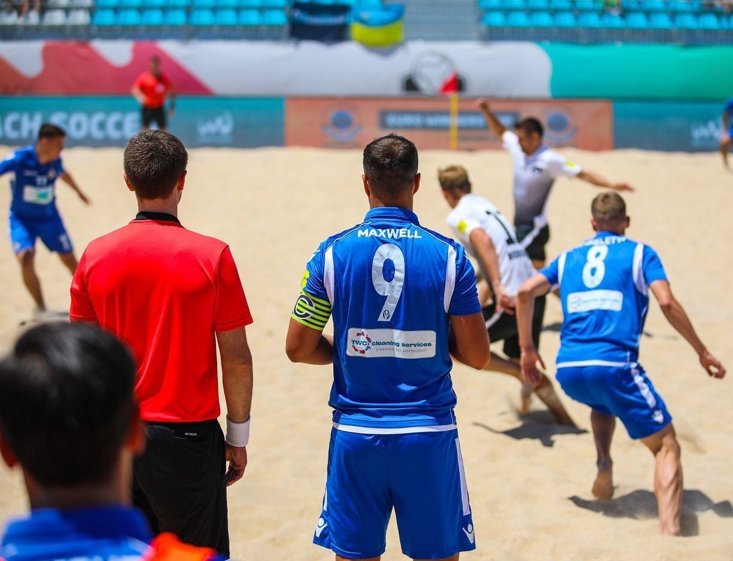
Joe is striving to illuminate beach soccer, the frenetic, neglected member of the football family; the one that’s familiar and recognisable yet still somewhat alien, taking elements of both the grass game and futsal (five-a-side played on a hard-court with a harder, smaller, low-bounce ball).
Just to provide a brief overview of the sand set-up, beach soccer matches are five-a-side matches, organised into three periods with a net length of twelve minutes each, divided by two three-minute breaks. Free kicks aren’t allowed to be defended by walls, throw-ins can be taken either conventionally or with feet (but within just four seconds), there’s unlimited substitutions, no annoying offsides, and dramatic acrobatics? You bet.
Fundamentally, it is a sport that allows no draws: a beach soccer match can be won or lost.
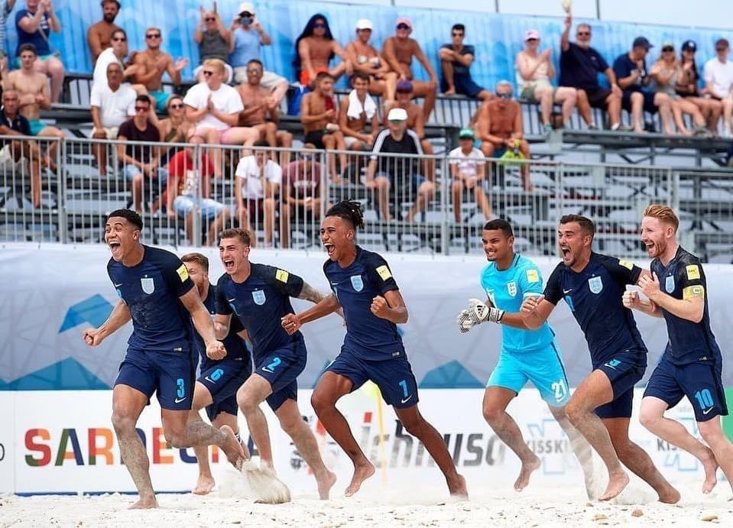
Southampton-based Joe, 30, trains with the national side on the purpose-built pitch at Lee Valley White Water Centre, London, and, when weather permits, on the beaches of Dorset. He supports himself through a sports coaching business, teaching in schools and utilising a football academy and setting up tournaments, as he strives to promote beach soccer at a youth level. The England international talked exclusively to The Sportsman as to why this sport should command your interest.
England isn’t the most famous for its beaches! How difficult is it to play beach soccer?
The main difference in beach soccer is being encouraged to keep and play the ball up in the air, as much as you can. That is your first thought. Coming over from grass football, I was always told - as a forward especially - to control the ball down and then play. With beach soccer, is the exact opposite. It’s a really different mindset. You have to have really good technical ability. It’s a very difficult sport - you can look amazing one minute and dreadful the next.
I’m surprised it isn’t more popular in England. In Portugal they have strived to master all three forms - ‘normal’ football, beach soccer, and futsal. And, importantly, that has resulted in them being champions in all three disciplines, becoming adept in all three areas, on the ground, up in the air, and a combination of the two.
How did you make the move from an interest in football to playing beach soccer?
I was taught at a very young age how to do a bicycle kick. I was brought up on a farm and my dad would just keep throwing the ball to me and I would just practice my overhead kicks all the time. I played at youth level for Southampton Football Club for about six years, got to a good level, but was really trying to build my fitness up and I was invited to the sand and do some sessions. From there I started to fall in love with it and didn’t look back.
A couple months later, the England manager called me up and asked me to train with the national set-up. Three months after that I received my first cap.
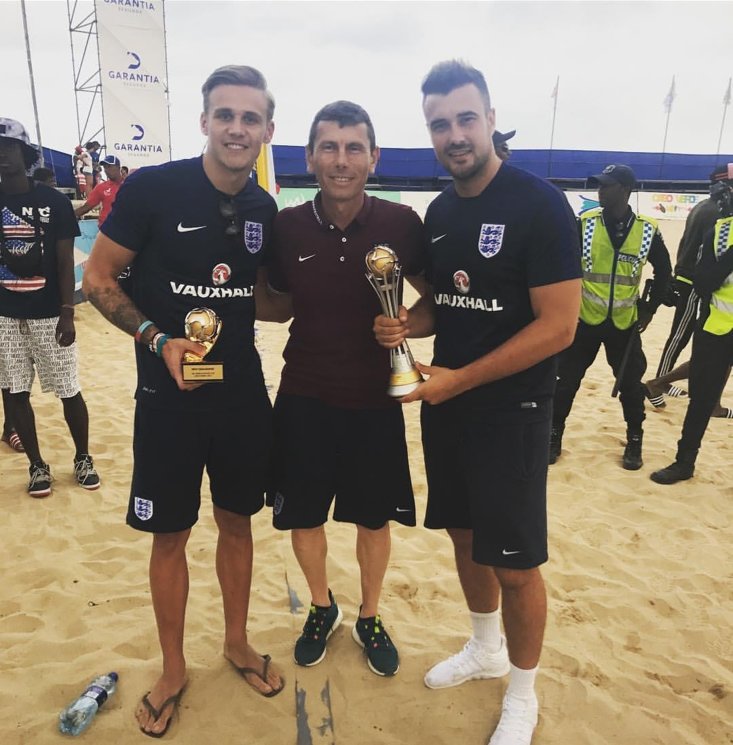
What are the physical exertions in beach soccer? Do common injuries differ from the more mainstream sport?
When I was younger, I struggled with a lot of knee injuries on grass. But since moving into beach soccer I have never had - touch wood - any. In fact, it’s offered strength conditioning to my legs. There are, however, small back injuries which are inevitable due to the amount of bicycle kicks and landings that are involved. What I have found out from playing on sand in bare-feet is that your feet learn to operate almost like a hand, gripping the surface, so by the end of a session your tendons are feeling it!
Your career can last a lot longer on sand in beach soccer. This is why we’re trying to bring football on sand into the mainstream and into training facilities, because it’s amazing for conditioning. Barcelona even have a sand pitch at their complex, which Lionel Messi and Luis Suárez have trained on.
Would you say it is a more or less tactical game, and are the variations in surfaces considerable factors towards a win?
It’s like a game of chess, with only five players on each team, the movement and the style of play. Fundamentally you have to understand the reason why you’re producing each move, and if you don’t, you won’t get the full pattern of play correctly. We have had players in the past who have failed this way and not doing things for the right reasons, making runs for the sake of it without intensity. If you get the patterns of play perfect, you can really upset teams.
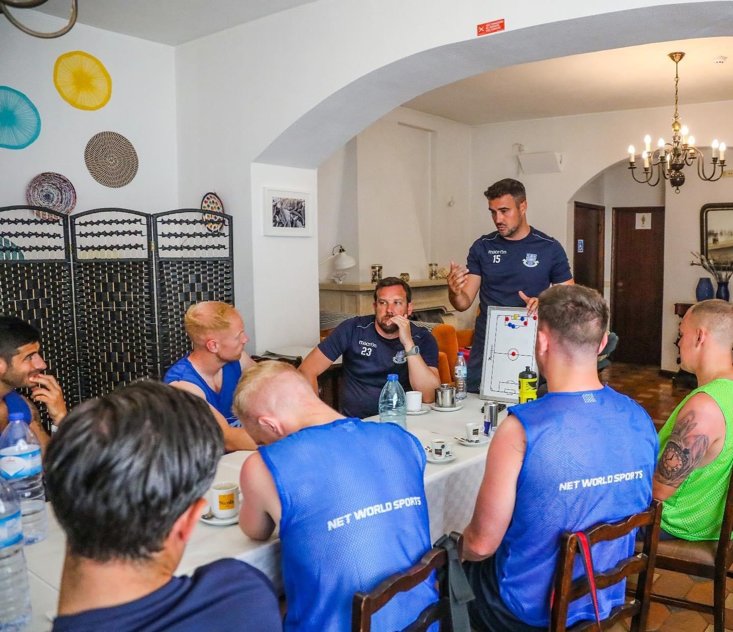
Are there the same hierarchies and power structures that we find in ‘normal’ football?
The best in the world is a battle between Brazil, Portugal, Spain and Italy. The Euro Beach Soccer League (ESL) comprises two divisions; A, consisting of the league's 12 best nations and B, consisting of the other teams. England are currently in Division B, but I’d probably say that we’re the best in that division on our day. We’ve got a big chance this summer - we’re going to Moldova at the end of August to compete for promotion.
Does the sport benefit countries with warmer climates and better access to the beaches, more?
Definitely. In England, especially in the winter, we continue to train but have to use ‘sand-socks’, which is almost like a scuba-diving sock designed to help us practice in the cold weather. Other countries have the enviable opportunities to train on natural surfaces. If you look at Rio de Janeiro in Brazil, for example, if you drove down that beach road you would see 30 - 40 beach soccer pitches already set up. Citizens from countries like Brazil are basically brought up to play the sport.
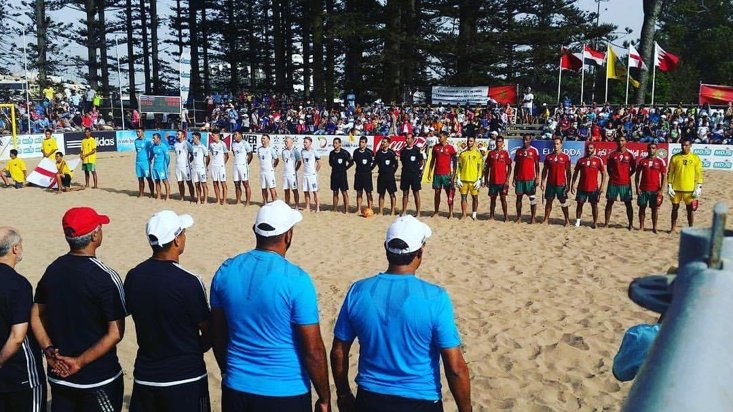
What are you now aiming for over the next few years?
There’s an opportunity to go to the World Beach Games this year, an event the Ladies team won silver at last year. There are two leagues in England at club level at the moment: the Northern National League and the stronger Southern National League, where a lot of the England internationals ply their trade. Our focus now is to help develop the Northern side to procure talent that will also help the national team.
I’ll of course love for the England national team to be promoted to Division A, then it’s looking at the FIFA World Cup, and the Olympics!
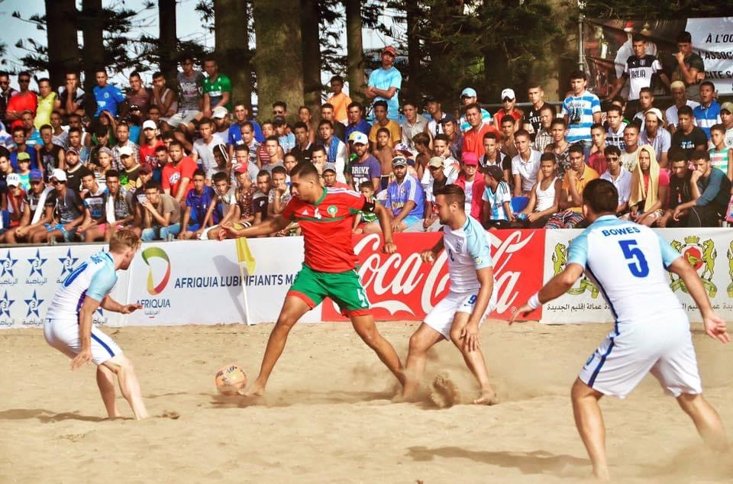
Finally, why does the sport need supporting, both financially and in person? How can people get involved?
We are looking for sponsorship, both for individual players and for the whole England set-up. The FA allows us to use the famous Three Lions badge, something that is very powerful, as a team member, to have but funding and sponsorship is so important.
It is such an entertaining sport, it is so inclusive. It takes place communally, in areas of enjoyment and leisure, surrounded by music which play throughout the games which are 36-minute set-pieces full to the brim of aesthetically pleasing goals, strikes, and skills.
Put it this way: people remember Gareth Bale’s amazing overhead kick against Liverpool in the 2018 Champions League Final. In beach soccer, that happens four or five times a match!